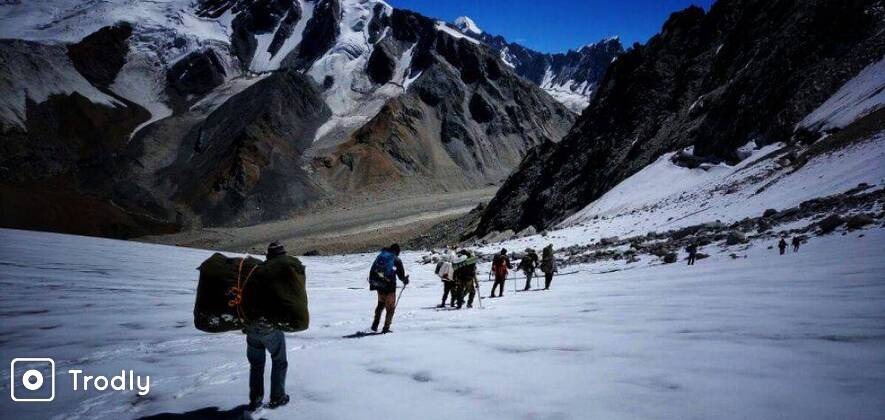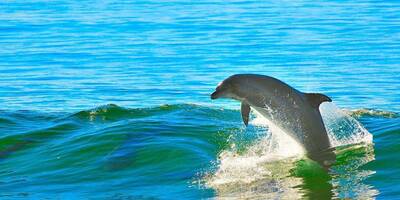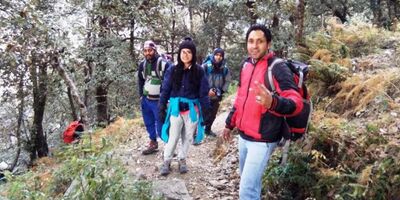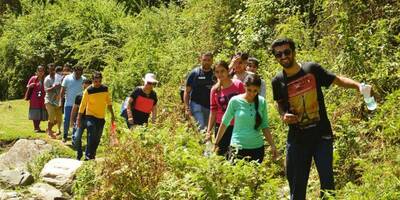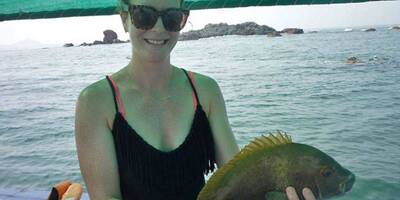Borasu Pass
Trip Overview
Borasu Pass is one of the four prominent passes of the higher region of Tons and Baspa glaciers. It’s a wonder why it’s rarely treaded on because it is a well-rounded trek that offers multiple landscapes. Borasu Pass or Bara-su (5,250 metres) is a high mountain pass located on the border of Uttarakhand and Himachal Pradesh along the Indo-Tibetan Border. It was an ancient trade route between Har-ki-Doon valley in Uttarakhand & Kinnaur valley in Himachal Pradesh. It is no longer used by the locals and is an escapade for trekkers and mountaineers. Borasu Pass Trek starts from Sankri in Uttrakhand and ends in the enchanting Baspa valley of Kinnaur and & ends at Sankri in Uttrakhand. Pass covers grasslands of Har-Ki-dun Valley , Jhukia Glacier and glacier lakes like Morinda taal and Borasu.
Highlights:
- Take an ancient trade route at 5360 m via Borasu Pass, crossing Uttarakhand and Reaching in Himachal
Brief Itinerary:
Day 1 Start your trail to Seema. Seema is 14 -16 km From Sankri. Take the trail that goes next to the Uttarakhand Forest Department Rest house. It is a well-marked trail and you may find many villages shepards and Locals throughout the trail.Continue on the trail ahead till you see Datmir village on the other side.cross a couple of wooden bridges on the small streams en-route.You can see Osla village at a distance. It takes approx 8-10 hours of hike before you finally reach Seema village.
Overnight at Seema Village.
Start your day with fresh Breakfast.The day will take you on a trail of 6-7 hours.Its a gradual climb initially through Osla Village.Trail on the left Bank of the Har ki Dun River until you reach the Har ki dun valley. Experience a gradual terrain and pleasant views of the valleys, plains and towering mountains. The gradual ascent to Har Ki Dun is adorned with wild orchid fields and from an elevation of 6,200m offers excellent views of the Swargarohini and Juandar glaciers. The trail is initially ascending, followed by a descent and a final ascend.
Look out for the Dev Thatch meadows to your right, early on in the trek.The trail will take you through pine forests, rhododendrons, a couple of streams, meadows and a waterfall. You will spot a few forest guest house huts, before you reach the Har Ki Dun campsite.On arrival at the Pass, settle down in the campsite with peaks of Har Ki Dun and Swargarohini towering above.
Today is going to be an easy day, with just a few hours of trekking from Har-ki-Doon Valley.This campsite is locally known as Lal Pathar, due to presence of a large and huge red boulder and hence the name Ratta-Tho.The trail passes through rocky terrain with huge boulders all around. The Valley gets Narrower as you walk past the rocky terrain.Soon, You come across the enchanting Marinda Tal, a glacial lake formed by the obstruction of the stream flowing from Borasu Glacier.Walk Pass the Marinda Tal and walk for another 45- 75 min until you reach Ratta- Tho.
Day 04 Get up early, have breakfast and head towards the Base Camp.The Trail is easy but steep.Throughout the journey witness the Borasu pass and Glacier at a Distance.Cross the Meadows and Climb the Rocky Bouler patch to reach Lamjunga.Lamjunga in Local language means long moustache.Looking at the pass, one can see the left and right ridges below the pass appear like a long moustache. From here, the Upper Lamjunga is a steep climb over the ridge.It takes another 45 min from here to reach Lamjunga.
Day 05 will require all your strength.The day will be tough and will require 12 -13 hours of trek.There will be an altitude change of appx. 300 m as you cross the Borasu pass.As you cross the Borasu Pass, the view is mesmerizing.Witness the clear blue skies, snow peaks, vertical snow slopes and the vast Zupica Glacier field below. The descent on the other side is a sheer vertical, so you may have to use rope / ice axes or you can simply Slide down.
Continue on the trail and cross the Zupica Glacier Moraine.The glacier is long will take approx 50 min to cross.Walk and walk until you reach the Bonga Camp Site.Set up your Tents and Relax from the tiring Journey.
Its a Descent Down towards ITBP Base Camp and Ranikanda and further down to Chitkul, the last Indian Village on the India China border.Once you cross Rani Kanda It Takes another 1 hour to reach the Chitkul Camp Site.
Take a drive from Chitkul to Shimla
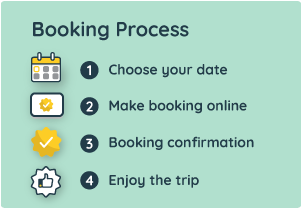
Basic Details
Inclusions
- Accommodation in Hotel/ Guest house Sankri on Day 0 and Chitkul on Day 07
- Accommodation in tents on sharing basis while camping during trekking.
- All meals – starting Breakfast on day 2 to dinner on day 07 (All Veg Meals + Egg meals )
- Trip Leader.
- Services of an experienced and certified Mountaineer & trekking route guide.
- Cook & attendant during the trekking
- All necessary technical equipments required for the trek(Sleeping bags,Sleeping Mats, Camps)
- Camping Fees, Entry fees and Trekking Permits.These charges are different for Foreign and Indian Travellers.
- Porterage fees for Carrying Kitchen/camping equipments/Luggage.
- All Transport using non A/c SUV starting from Dehradun to Sankri and Chitkul to Shimla.
- Service Tax of 9% as applicable by govt. of India
Exclusions
- Any airfare / Bus fare / train fare or airport tax
- Meals other then mentioned in cost inclusion
- Trekking Shoes and clothing and other items of personal belonging.
- Any kind of insurance, Medical evacuation charges, Travel insurance, repatriation charges, Damages/ claims of any nature, Expenses of personal nature like telephone calls, Laundry, Any kind of hard or soft drinks.
- Any kind of personal clothing
- Any other expense not mentioned in the cost inclusion column.
- Any cost arising out of unforeseen circumstances such as bad weather, landslides , road conditions and any other circumstances beyond our control.
- Personal porter to carry Luggage
Why book with TRODLY
- Best Price Guarantee
- Verified customer reviews that help you make the right decision.
- Qualified operators. All partner operators selected after rigorous system of checks.
- Free Cancellation on Most Trips
- Only Best Trips - Our team of travel experts bring uniquely local, safe, and exciting experiences to the community.
- 100% Secured Payments
Important Information
Question 1- Is this Trek Safe for Amateurs
Some Degree of Fitness is required to Complete this trek. An experience into High Altitude Trekking Expeditions is required and can safely complete this trek with in the designated time.
Question 2- What is the maximum Altitude Covered
The maximum altitude covered during the trek is 5360m m, (Borasu Pass)
Question 3 -How will we deal with altitude acclimation?At higher altitudes
The kind we experience frequently on our treks- your cardiac and pulmonary systems are affected by lower oxygen density. Our bodies must adjust to the mountain elevation gradually, or we can become ill. Physical symptoms can range from general breathing difficulties all the way to acute mountain sickness (altitude sickness, soroche, or "the bends"). To avoid altitude-related maladies, we pace our treks appropriately and incorporate acclimatization days throughout the itinerary. There are points throughout many treks during which trekkers may choose to either tackle additional hikes/day trips or rest and relax as their bodies demand.
Question 4 -How do I Reach Sankri
Sankri Being one of the trek start points for Number of treks in Uttrakhand is well connected by Dehradun.
Question 5-What communication options exist while trekking?
What communication options exist while trekking?
It varies. Mobile coverage is expanding around the world rapidly, and the Himalayas are no different… did you know that 3G coverage is available all over Mount Everest? There is no guarantee of uninterrupted coverage.
Cancellation Policy
- Full refund if cancelled before* 30 days
- 50% refund if cancelled before 7 days
- No refund after that
Meet-up Information/Reporting Point
Similar Exciting Activities

Get trip inspirations, offers and more.

